Quick Summary:
The dispute between Firebase vs MongoDB has raged in the development industry for a long time. With the growth of the cloud, managed services have swept the industry, raising development expectations in the process. A new generation of customers demands highly useable, dramatically simplified interfaces and fully managed, self-service experiences in every business, and developers are no exception. It’s an exciting time in database and software development, as new developer productivity and data utility levels are being unlocked.
Because of technology advancements, mobile app development is fast growing. A company must stay up with shifting trends. However, in a hurry to stay up with technological advancements, they will make mistakes that could be disastrous. One such blunder would be to design a mobile app with an incompatible database.
The primary goal of mobile app development is to reach many mobile users and convert them into customers. You must consider your iOS, Android, and web app users to achieve this aim. To save data and support these apps, you’ll also need secure cloud storage. Your program may crash if the database is not built correctly or set up.
Since its creation, Firebase DB Vs MongoDB has ruled the roost in app development, and the fact that both are NoSQL databases adds to the intrigue. Companies are increasingly turning to NoSQL databases because of their ability to operate best with real-time data and massive data. Below, DB Engine illustrates the growth of MongoDB vs Firebase.
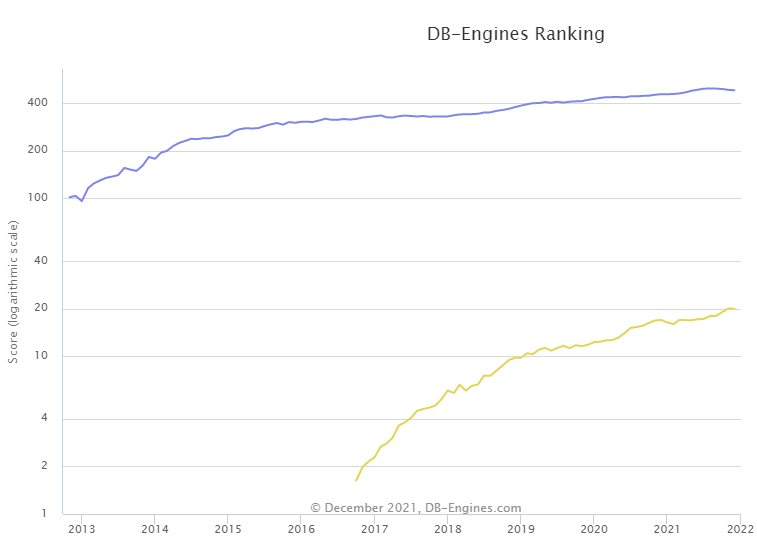
As a result, this article covers every aspect of Firebase vs MongoDB. It will provide you with insight into the factors that characterize the database and provide them with an advantage over the competition. Let’s take a closer look at the differences between MongoDB and Firebase before moving on.
What is NoSQL?
It’s a data storage and retrieval system that’s not relational. To put it another way, think about NoSQL as a tree. As data accumulates, each new piece of information adds a new branch to the tree, with new sub-branches. The project’s handling of real-time data and massive data is best suited to NoSQL.
Here’s a rundown of some of the best NoSQL databases:
- MongoDB
- Firebase
- Cassandra
- Elasticsearch
- Couchbase
- Oracle NoSQL
- HBase
- Memcached
- CouchDB
- Red
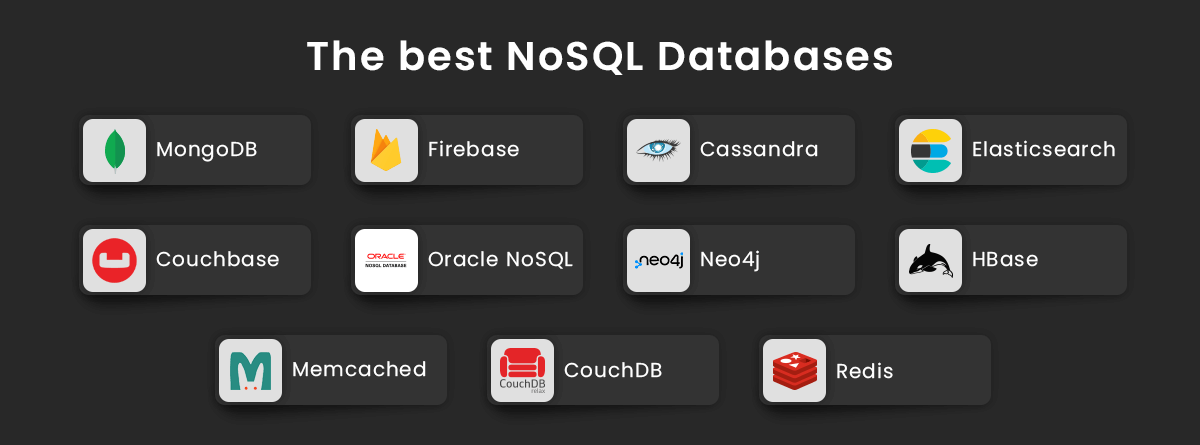
We’ll concentrate on the two most popular databases today: MongoDB and Firebase. You can utilize either of them because they both provide excellent data backend services.
What is Firebase?
In the year 2012, Google released Firebase. It’s a lot more than a database, and it’s a full-featured platform for creating web and mobile apps, and Google owns a real-time Backend-as-a-Service. The real-time database from Google Firebase is ideal for apps that must handle data in real-time across numerous devices and thus a preffered choice of all Professional Mobile App Developers. Cloud Firestore is the name of Firebase’s database service. It operates in near-real-time, retrieving updates from your database as they occur. Because Firestore is part of the Cloud Firebase services, it integrates seamlessly with all other Firebase products.
The real-time database is more of a publish/subscribe system for quick data ingestion and processing, whereas the cloud firestore is for long-term data storage and retrieval. With a SQL-like query mechanism optimised for asynchronous processing, Cloud Firestone provides a programmatic interface for retrieving data based on “references.”.
ref = db.reference('aliens')
snapshot = ref.order_by_child('number_of_eyes').equal_to(3).get()
aliens = [{key: value} for key, value in snapshot.items()]
Firebase Architecture
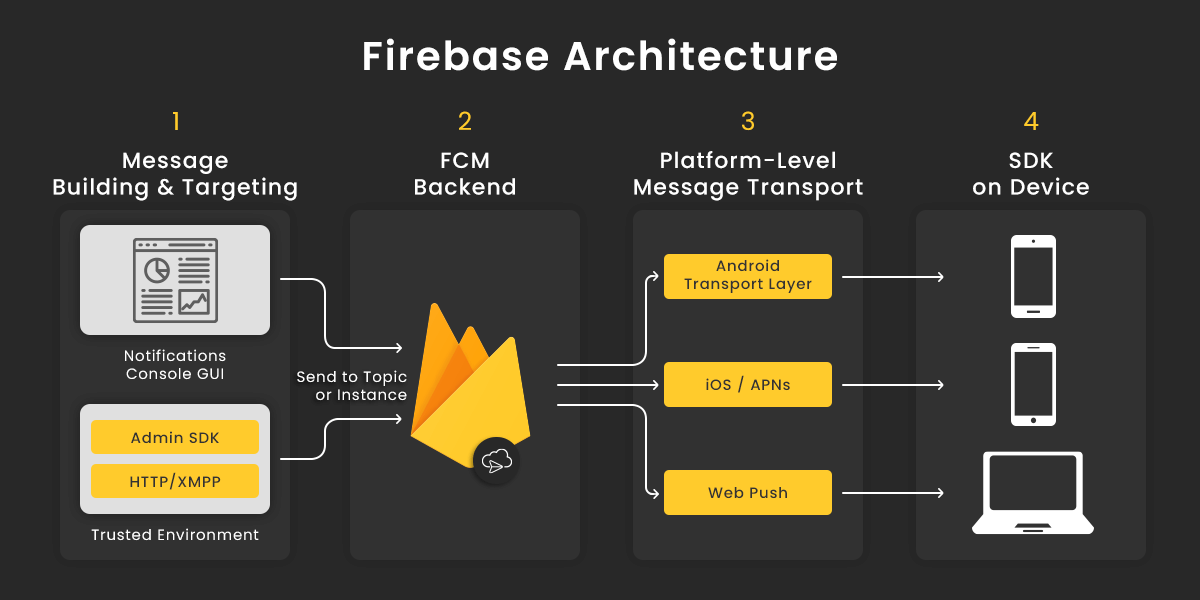
Features of Firebase
- Realtime Database
- Hosting
- Authentication
- Storage
- Cloud Messaging
- Remote Config
- Test Lab
- Crash Reporting
- Notifications
- App Indexing
- Dynamic Links
- Invites
- AdWords
- AdMob
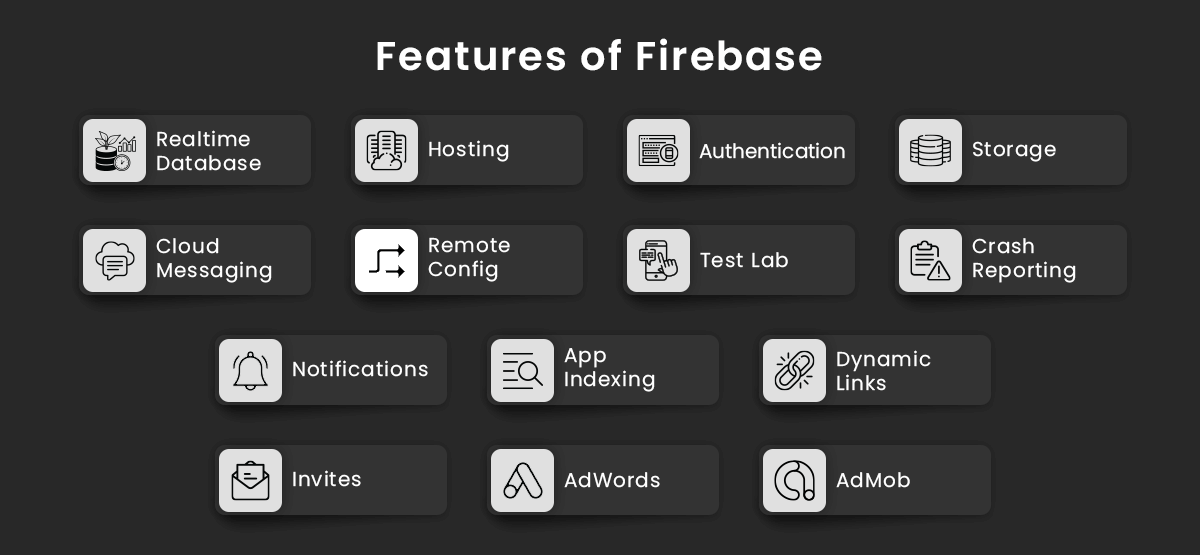
Supported languages by Firebase
- Java
- JavaScript
- Objective-C
- C++
- Swift
Pros & Cons of Firebase
| Pros | Cons |
| Instant data updates without refreshing | Firebase has a complex security protocol |
| Multiple computers synchronize. | Firebase only has paid version, so you can’t set up Firebase on your server. You will have to purchase Google’s server. |
| Heavy Traffic management | There are no relational queries in Firebase. |
| Cloud-based event queue | You don’t own the servers that host your data, so it’s not possible to export your user data. |
| Firebase Push Notifications | Dealing with relations with Firebase is quite complex |
| Ideal for real-time and big data applications | Tricky Data Migration |
| Offers pay-as-you-go plan with flexible rates | – |
| It offers synched Application State. | – |
| This one offers a superfast CDN for static websites. | – |
| Allows straightforward hosting | – |
When to use Firebase?
Another criterion for evaluating the heated battle between Firebase vs MongoDB. The scenarios in which Firebase can be used are listed below.
- If the app needs real-time data and if you’re short on the application development time.
- As per requirement, you are planning to scale the mobile app frequently.
- Need of intuitive API with having seamless third-party integration.
- Need of real-synchronization between browser and devices
- If you’re building social media apps, messaging apps, gaming apps, etc.
When not to use Firebase?
Now let’s take a look at the situation where the business should avoid using Firebase. They are as follows:
- If you’re building an iOS app.
- If you’re willing to own your user data.
- Firebase is not cheap when your monthly plan exceeds the time limit.
What is MongoDB?
MongoDB Inc. is the company that created and maintains MongoDB. It’s a NoSQL database that’s free to use. MongoDB is a robust document database that, unlike Firebase, provides a comprehensive ecosystem of services. When designing MongoDB, two criteria were taken into account: scalability and flexibility. It has a lot of querying and indexing power. MongoDB is extensively utilized because of its tremendous storage capabilities, even though it only provides a concentrated service in data storage. MongoDB gives developers additional flexibility when creating programs. MongoDB meets its development requirements, allowing the program to store data efficiently.
MongoDB Architecture
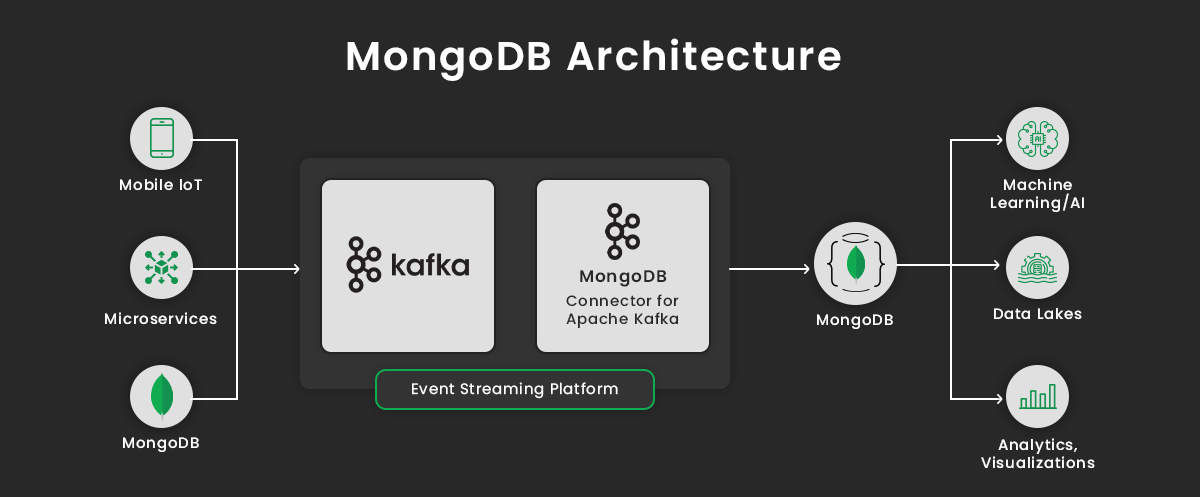
Features of MongoDB
- Data analytics support
- Dynamic schemas support
- Real-time Data reporting
- Adjustable and document-based
- Excellent cloud-based storage support
- Easy to understand database architecture

Supported Language by MongoDB
- Actionscript info
- C
- C#
- C++
- Clojure info
- ColdFusion info
- D info
- Dart info
- Delphi info
- Erlang
- Go
- Groovy info
- Haskell
- Java
- JavaScript
- Lisp info
- Lua info
- MatLab info
- Perl
- PHP
- PowerShell info
- Prolog info
- Python
- R info
- Ruby
- Rust
- Scala
Pros & Cons of MongoDB
| Pros | Cons |
| MongoDB has powerful sharding and scalability capabilities | MongoDB is infamous for leaking, corrupting, or losing data over time. |
| No rigid schema | MongoDB is not decisive for the indexing & searching process |
| MongoDB gives flexibility | MongoDB is not ACID compliant |
| Data Representation in JSON or BSON | No function or store procedure support |
| MongoDB has Geospatial support | Confusing Middleman arrangements |
| Easy integration with Bigdata Hadoop | Complicated queries |
| MongoDB offers a free version when you configure on-premise. With the paid version, you will get a serverless setup. | – |
| Vast document collection | – |
| MongoDB is considered Highly secured because no SQL injection can be done. | – |
When to use MongoDB?
There are certain situations where using MongoDB is preferred as compared to Firebase. They are:
- When the app has evolving data requirements
- MongoDB is preferred for extensive enterprise data management
- The app requires high-speed logging and real-time analytics
- There is a need to maintain location-based data
- Requirement of high scalability and better caching
When not to use MongoDB?
The following are the times where the business should refrain from using MongoDB. They are as follows:
- Need for ACID compliance
- When you’re planning to build a detailed design system
- Highly transactional system
- When the data model is designed upfront.
Now that we have understood Firebase and MongoDB in detail. Let’s take a look at the difference between them.
Firebase vs MongoDB: The Comparison
| Factors | Firebase | MongoDB |
| Developed By | MongoDB, Inc | |
| Initial release | 2012 | 2009 |
| Performance | Inferior to MongoDB | Seamless performance with high traffic apps |
| License | Commercial | Open-Source |
| Cloud Support | Yes | No |
| Server Operating System | Hosted | Linux, OS X, Solaris, Windows |
| Supported Programming language | Java, JavaScript, Objective-C | Java, JavaScript, NodeJS, Perl, C, C#, Python, PHP,etc |
| Security | Less Secure compared to MongoDB | More Secured compared to Firebase |
| API and other access methods | Android, iOS, JavaScript API, RESTful HTTP API | Proprietary protocol using JSON |
| Suitable for | small-scale applications | large-scale application |
| Replication Method | Doesn’t Support Replication | Supports Master-Slave Replication |
| Map-reduce method | Doesn’t support Map-Reduce Method | Supports Map-Reduce Method |
| Partitioning Method | Doesn’t support Partitioning Method | Supports Partitioning Method |
| Salary | 90K/yr | 78K/yr |
Firebase vs MongoDB: The Key Differences
Let’s take a look at the detailed key difference between Firebase and MongoDB with the following points.
Firebase vs MongoDB: Categorization
The categorization of Firebase vs MongoDB is the most significant distinction. The database is MongoDB, and the platform is Firebase. MongoDB is a document-oriented JSON-based database. Both organized and unstructured data are stored in the MongoDB database. The database is dynamic and includes features such as scalability, replication, and auto-recovery. Firebase, on the other hand, is a cloud-based real-time application platform for sharing data in real-time. Data on the Firebase platform can be shared from any device.
Firebase vs MongoDB: Data Storage
Choosing the correct platform for storing data is another distinction between the Firebase and MongoDB databases. Firebase is easily accessible from faraway locations because it is a real-time backend platform that keeps data in the cloud. In comparison to other types of databases, the Firebase platform is simple to set up. The Firebase database is most commonly used for short-term applications, making the platform more responsive and quick. The data retrieval time in the Firebase database is relatively short. The MongoDB database is a NoSQL database, which means it does not have a structure. Data can be stored in two different formats: structured and unstructured. The information is kept in JSON format. MongoDB is simple to use, making it an excellent database to employ. The MongoDB database is most commonly used for large-scale applications that demand an extensive database since vast amounts of data must be stored in the database.
Firebase vs MongoDB: Price
| Firebase | MongoDB |
| Free Trial Available
Spark – $5per month Candle – $49per month Bonfire – $149per month |
Cloud, On-premises, Realm
Shared – $0 Dedicated – $57/month Serverless – $0.30/million reads |
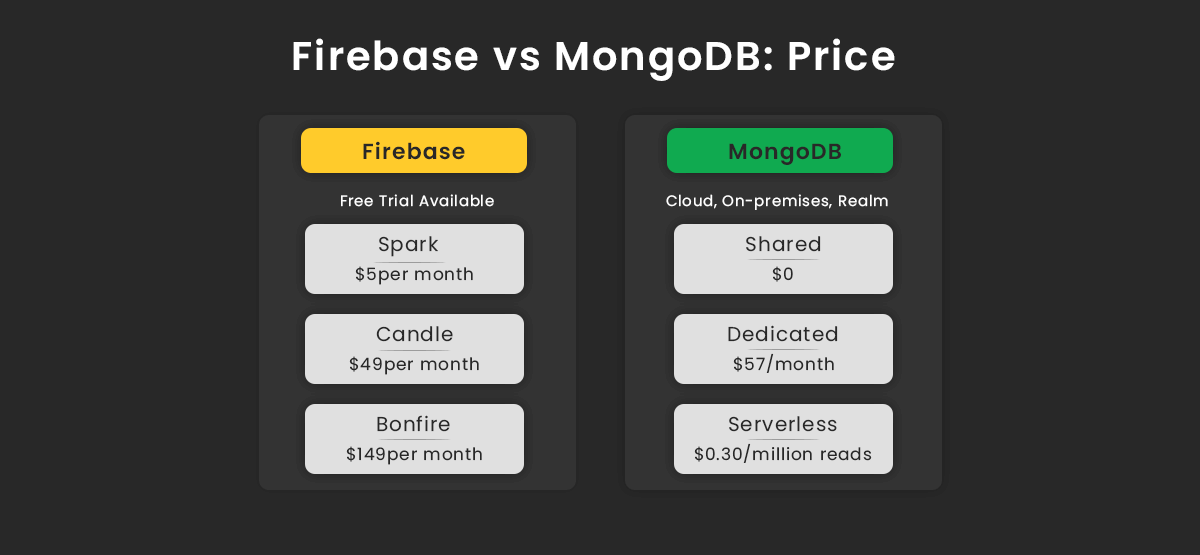
Firebase Vs MongoDB: Performance
The stability and performance of Firebase vs MongoDB are the other significant distinctions. In comparison to Firebase, the MongoDB database is more stable. The fact that Firebase stores data on a cloud platform makes the server unreliable and restricts its flexibility. When compared to Firebase, MongoDB offers a significant performance advantage. In comparison to Firebase, the servers are more stable.
Firebase vs MongoDB: Use of Service
The utilization of the service is one of the contrasts between Firebase and MongoDB. Anonymous users can use the firebase, and it can be accessed from far away. Any device can access the data stored in Firebase, and authorized users can only access the database’s store data in the MongoDB database. In addition, because the MongoDB database has more security features than Firebase, proper authentication is required.
Firebase vs MongoDB: Market popularity
The market popularity of both Firebase vs MongoDB can be seen with Google trends. As you can see in the Graph of queries presented, there is an average of 70 queries for MongoDB and 42 queries for Firebase.

And if we talk about, Stack Overflow Trends, Firebase get a steep jump while MongoDB is getting stagnenet increase. However, currently both are on same level relatively.
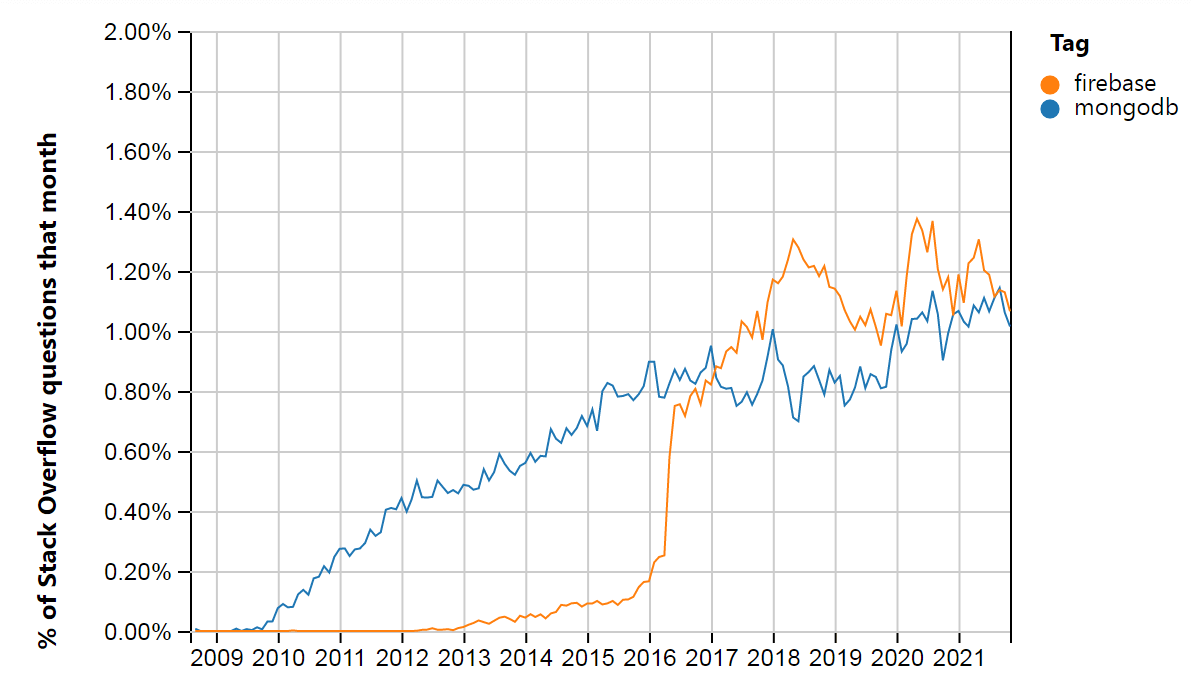
Firebase vs MongoDB: Salary
Another stark difference between MongoDB vs Firebase is salary. According to Payscale.com, the salary of a MongoDB developer is 90K/yr, whereas the salary of a Firebase developer is 78K/yr.

Top companies using MongoDB
Following are some of the top companies that use MongoDB as their database.
- Adobe
- eBay
- Coinbase
- SEGA
- EA
- Verizon
- eharmony
- BOSCH

Top companies using Firebase
Following are some of the top companies that use Firebase as their database.
- Alibaba
- Shazam
- Venmo
- The New York Times
- NPR One
- The Economist
- Duolingo
- Lyft

Firebase Vs Mongodb: In 2021, Who Will Have The Upper Hand?
Every database is developed with different functionalites that cater to unique business requirements. For picking the best-fit database for web/app development, consider the following questions before making your choice between MongoDB and Firebase –
- Is your project a requirement for a large-scale company, or does it necessitate the use of real-time data?
- Is your project going to need a cloud-based backend structure?
have a unique app Idea?
Hire Certified Developers To Build Robust Feature, Rich App And Websites
If you’re still in the dilemma of choosing the right one for your project, Hire Professional Team Developers will assist you in making the right choice as per your unique project requirements.
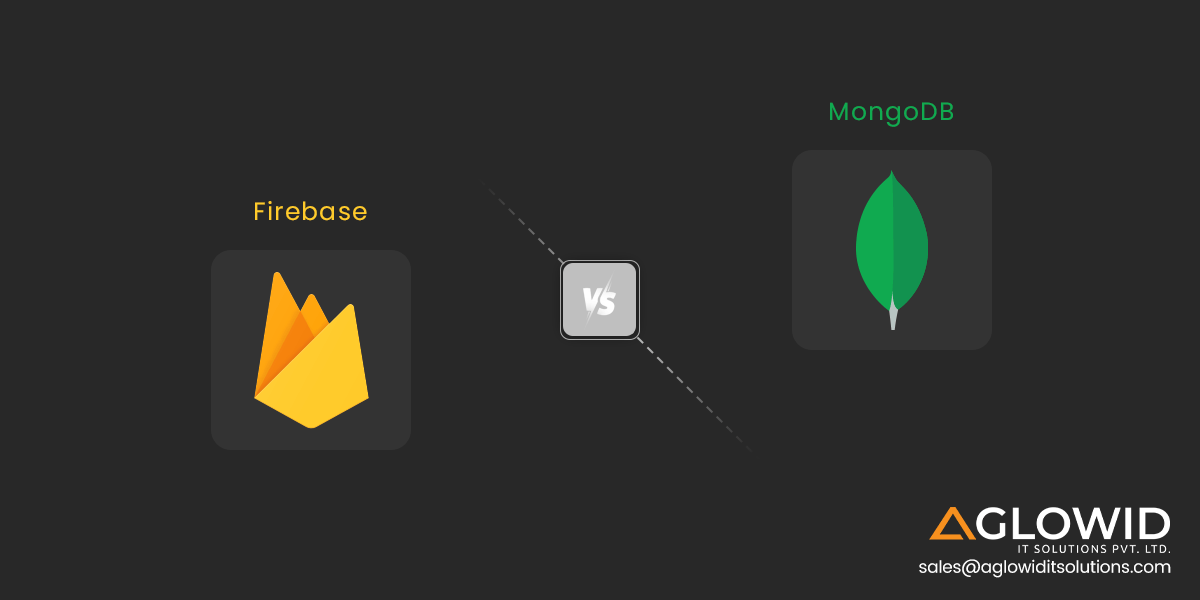
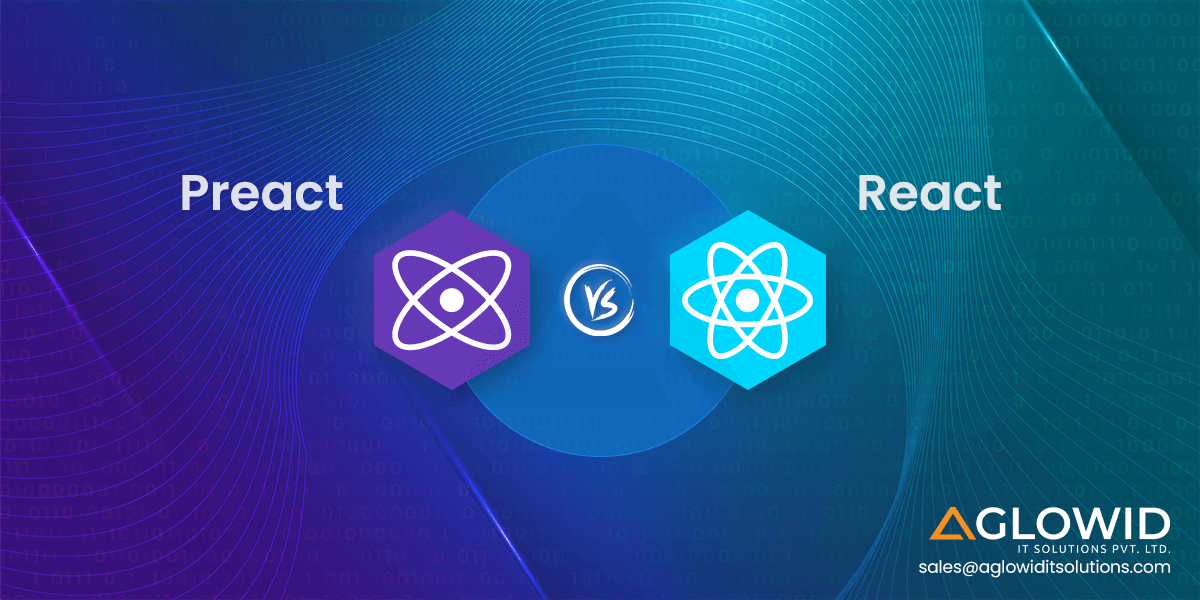
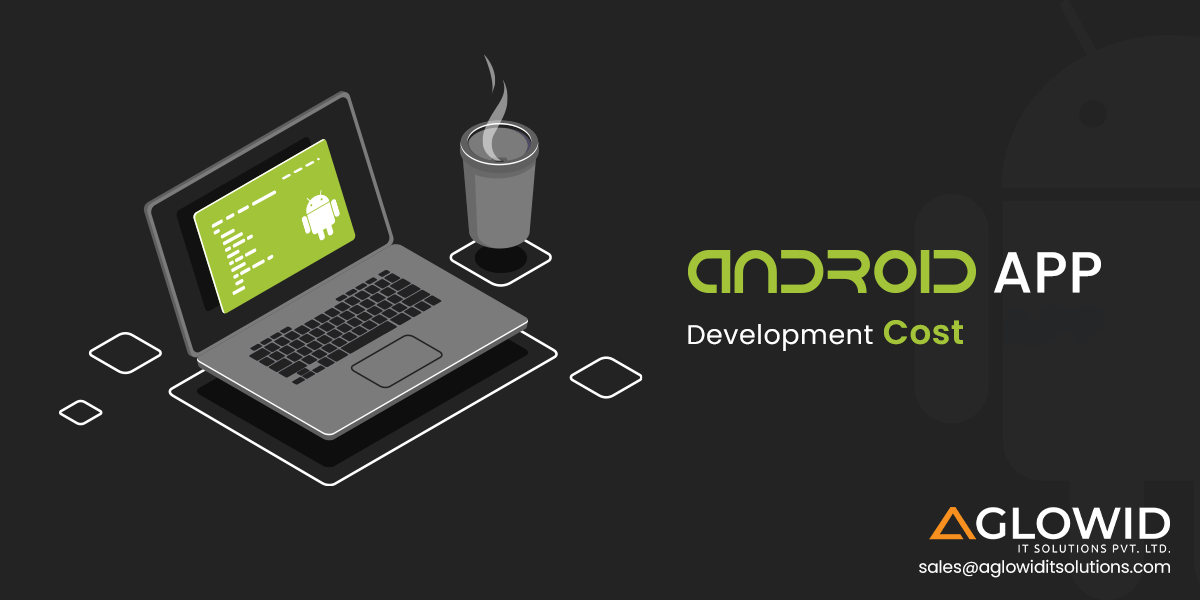


 Say
Say